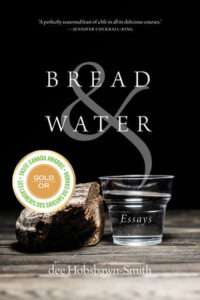By Ariel Gordon
Bread & Water
by dee Hobsbawn-Smith
University of Regina Press (2021)
dee Hobsbawn-Smith is somehow known both for being a Calgary chef, food writer, and single parent AND a Saskatoon literary writer in a settled and loving relationship with writer Dave Margoshes.
But that’s not all: she was somehow both a farm kid, with generations of history in one place, and air force brat, moving every few years.
Two things unite all these selves: food and floodwater.
In 2010, dee left Calgary behind when her parents wanted to retire from farming and move to town and dee wanted a place to write.
Right after she and Dave move to the family farm, west of Saskatoon, it rains for a month straight. The wet fall is followed by a brutally cold winter; when spring comes, they discover that all that water has stayed on the land. Their farm is the lowest in the district, so everything besides the farmhouse is flooded.
Suddenly, their land-locked home has a lake view.
If that wasn’t bad enough, in 2013, dee gets word that her house in Calgary, where her son and his partner live, has been damaged beyond repair by the catastrophic flooding of the Bow River.
In 2018, the floodwater finally recedes, taking with it the flocks of shorebirds and waterfowl that dee and Dave have come to love and ending the seven-year run of their New Year’s Day jam-pot curling tournament.
The four essays that tell this watery story—focused on place, identity, and nature—are for me the heart of the book. They’re long and meditative, narrated by a mature writer, telling you about life as it stands for her now.
They remind me of Luanne Armstrong’s The Light Through the Trees, on being a woman, a writer, and a single-parent as well as a third- generation farmer in the Kootenays and of Brian Brett’s Trauma Farm, which takes us through the hours of a day on a mixed farm on Salt Spring Island.
Don’t get me wrong: I like young-ambitious-chef dee and Calgary-food-writer dee.
I’m happy to read about dee falling in love with food, from her first jobs out of the cook-training program at a Vancouver technical college to owning her own restaurant in Calgary to cooking with her adult sons in Saskatchewan.
I’m even happy to tag along on dee’s magazine assignments. Like when she takes us through the Rockies, reviewing the fare on the luxury CPR tourist trains, or when we land on Cortes Island for oysters. dee is writing about shellfish but her real goal is to shed the aversion to the bivalve she’d learned in childhood.
The most substantial of these essays is “Wiebo’s Way,” which won Prairie Fire’s Creative Nonfiction Writing Contest in 2018. It chronicles her visit to Wiebo Ludwig’s controversial Trickle Creek community, just as she’s attempting to build a life as a newly-divorced single parent, as a freelance food writer.
If water is the heart and food the bones of this book, the head and feet are provided by food writer M.F.K. Fischer, the American food writer, and dee’s father W. Paul Smith, a fighter pilot in the RCAF and then, reluctantly, a farmer with five children.
dee is given one of Fischer’s books as a young chef and, later, works with her translation of French lawyer Jean Anthelme Brillat- Savarin’s 1825 treatise on all things food, The Physiology of Taste, for her MA in English.
In her preface, dee marks the first anniversary of her father’s sudden death by reading one of Fischer’s later works, where she is traveling with her second husband, who is dying as the Second World War begins.
The post-script sees her responding in the moment to her father’s death, raising a glass. And so, like Fischer, dee’s father begins and ends Bread & Water.
Bookends aside, there’s an entire life in this book, from childhood to late middle age, filled with dee’s dreams for herself and for her children. But it is also a table groaning with platters of food.
And, as dee notes in “The Pleasure of Your Company,” who doesn’t like to be asked to dinner?
Ariel Gordon is a Winnipeg/Treaty 1 Territory-based writer, editor, and enthusiast. She is the author of Treed: Walking in Canada’s Urban Forests (Wolsak & Wynn, 2019).

